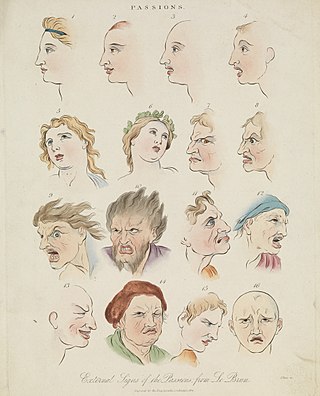
Emotions are physical and mental states brought on by neurophysiological changes, variously associated with thoughts, feelings, behavioral responses, and a degree of pleasure or displeasure. There is no scientific consensus on a definition. Emotions are often intertwined with mood, temperament, personality, disposition, or creativity.

Guilt is a moral emotion that occurs when a person believes or realizes—accurately or not—that they have compromised their own standards of conduct or have violated universal moral standards and bear significant responsibility for that violation. Guilt is closely related to the concept of remorse, regret, as well as shame.
According to the APA Dictionary of Psychology, a feeling is "a self-contained phenomenal experience"; and feelings are "subjective, evaluative, and independent of the sensations, thoughts, or images evoking them". The term feeling is closely related to, but not the same as, emotion. Feeling may for instance refer to the conscious subjective experience of emotions. The study of subjective experiences is called phenomenology. Psychotherapy generally involves a therapist helping a client understand, articulate, and learn to effectively regulate the client's own feelings, and ultimately to take responsibility for the client's experience of the world. Feelings are sometimes held to be characteristic of embodied consciousness.
In psychoanalytic theory, a defence mechanism is an unconscious psychological operation that functions to protect a person from anxiety-producing thoughts and feelings related to internal conflicts and outer stressors.

Arlie Russell Hochschild is an American professor emeritus of sociology at the University of California, Berkeley and writer. Hochschild has long focused on the human emotions that underlie moral beliefs, practices, and social life generally. She is the author of ten books, including the forthcoming Stolen Pride: Loss, Shame, and the Rise of the Right. Stolen Pride is a follow-up to her last book, Strangers in Their Own Land: Anger and Mourning on the American Right, a New York Times Bestseller and finalist for the National Book Award. Derek Thompson described it as "a Rosetta stone" for understanding the rise of Donald Trump.
Rational emotive behavior therapy (REBT), previously called rational therapy and rational emotive therapy, is an active-directive, philosophically and empirically based psychotherapy, the aim of which is to resolve emotional and behavioral problems and disturbances and to help people to lead happier and more fulfilling lives.
Emotional labor is the process of managing feelings and expressions to fulfill the emotional requirements of a job. More specifically, workers are expected to regulate their personas during interactions with customers, co-workers, clients, and managers. This includes analysis and decision-making in terms of the expression of emotion, whether actually felt or not, as well as its opposite: the suppression of emotions that are felt but not expressed. This is done so as to produce a certain feeling in the customer or client that will allow the company or organization to succeed.

Passion denotes strong and intractable or barely controllable emotion or inclination with respect to a particular person or thing. Passion can range from eager interest in, or admiration for, an idea, proposal, or cause; to enthusiastic enjoyment of an interest or activity; to strong attraction, excitement, or emotion towards a person. It is particularly used in the context of romance or sexual desire, though it generally implies a deeper or more encompassing emotion than that implied by the term lust, often incorporating ideas of ecstasy and/or suffering.
Herbert George Blumer was an American sociologist whose main scholarly interests were symbolic interactionism and methods of social research. Believing that individuals create social reality through collective and individual action, he was an avid interpreter and proponent of George Herbert Mead's social psychology, which he labeled symbolic interactionism. Blumer elaborated and developed this line of thought in a series of articles, many of which were brought together in the book Symbolic Interactionism. An ongoing theme throughout his work, he argued that the creation of social reality is a continuous process. Blumer was also a vociferous critic of positivistic methodological ideas in sociology.
In sociology, social action, also known as Weberian social action, is an act which takes into account the actions and reactions of individuals. According to Max Weber, "Action is 'social' insofar as its subjective meaning takes account of the behavior of others and is thereby oriented in its course."
Emotion work is understood as the art of trying to change in degree or quality an emotion or feeling.
Feeling rules are socially shared norms that influence how people want to try to feel emotions in given social relations. This concept was introduced by sociologist Arlie Russell Hochschild in 1979. Hochschild's 1983 book, The Managed Heart: Commercialization of Human Feeling, discusses feeling rules in greater depth, especially in the occupational worlds of flight attendants and bill collectors. Hochschild draws on the work of sociologist Erving Goffman as well as labor scholar Harry Braverman to discuss the dramaturgical demands and emotional labor entailed by jobs in the service sector, in which workers must "perform" certain roles that entail abiding by certain feeling rules. She notes that women are more likely to have such jobs than men, and that analysis of feeling rules may therefore be especially relevant to understanding the gendered dimensions of labor. This work foreshadows themes from her later analyses of women's work, both paid and unpaid, e.g. in The Commercialization of Intimate Life (2003).
Appraisal theory is the theory in psychology that emotions are extracted from our evaluations of events that cause specific reactions in different people. Essentially, our appraisal of a situation causes an emotional, or affective, response that is going to be based on that appraisal. An example of this is going on a first date. If the date is perceived as positive, one might feel happiness, joy, giddiness, excitement, and/or anticipation, because they have appraised this event as one that could have positive long-term effects, i.e. starting a new relationship, engagement, or even marriage. On the other hand, if the date is perceived negatively, then our emotions, as a result, might include dejection, sadness, emptiness, or fear. Reasoning and understanding of one's emotional reaction becomes important for future appraisals as well. The important aspect of the appraisal theory is that it accounts for individual variability in emotional reactions to the same event.

The sociology of emotions applies sociological theorems and techniques to the study of human emotions. As sociology emerged primarily as a reaction to the negative effects of modernity, many normative theories deal in some sense with emotion without forming a part of any specific subdiscipline: Karl Marx described capitalism as detrimental to personal 'species-being', Georg Simmel wrote of the deindividualizing tendencies of 'the metropolis', and Max Weber's work dealt with the rationalizing effect of modernity in general.
Psychoanalytic criminology is a method of studying crime and criminal behaviour that draws from Freudian psychoanalysis. This school of thought examines personality and the psyche for motive in crime. Other areas of interest are the fear of crime and the act of punishment.
Display rules are a social group or culture's informal norms that distinguish how one should express oneself. They function as a way to maintain the social order of a given culture, creating an expected standard of behaviour to guide people in their interactions. Display rules can help to decrease situational ambiguity, help individuals to be accepted by their social groups, and can help groups to increase their group efficacy. They can be described as culturally prescribed rules that people learn early on in their lives by interactions and socializations with other people. Members of a social group learn these cultural standards at a young age which determine when one would express certain emotions, where and to what extent.

The Managed Heart: Commercialization of Human Feeling, by Arlie Russell Hochschild, was first published in 1983. In it, she documents how social situations influence emotions through the experiences of flight attendants and bill collectors.
Emotions in the workplace play a large role in how an entire organization communicates within itself and to the outside world. "Events at work have real emotional impact on participants. The consequences of emotional states in the workplace, both behaviors and attitudes, have substantial significance for individuals, groups, and society". "Positive emotions in the workplace help employees obtain favorable outcomes including achievement, job enrichment and higher quality social context". "Negative emotions, such as fear, anger, stress, hostility, sadness, and guilt, however increase the predictability of workplace deviance,", and how the outside world views the organization.
Self-estrangement is the idea conceived by Karl Marx in Marx's theory of alienation and Melvin Seeman in his five logically distinct psychological states that encompasses alienation. As spoken by Marx, self-estrangement is "the alienation of man's essence, man's loss of objectivity and his loss of realness as self-discovery, manifestation of his nature, objectification and realization". Self-estrangement is when a person feels alienated from others and society as a whole. A person may feel alienated by his work by not feeling like he has meaning to his work, therefore losing their sense of self at the work place. Self-estrangement contributes to burnout at work and a lot of psychological stress.

The commercialization of love refers to the process of turning romantic relationships and expressions of love into marketable commodities. Overall, commercialization encourages people to express their feelings through purchased goods and services, often driven by social norms and marketing strategies.






